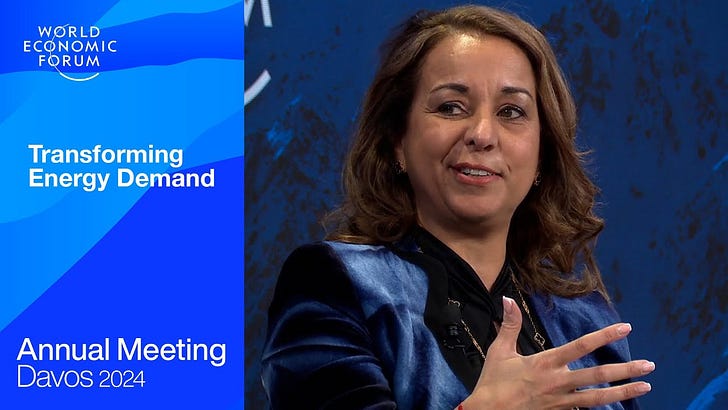Peter Joshua: “Ohh... which view would you prefer?”
Reggie Lampert: “The one you're blocking.”
Audrey Hepburn in Charade, Universal Pictures, 1963
Davos, Switzerland: Playground of the rich and famous, and home to the annual World Economic Forum. The 2024 meeting, featuring the usual cast of techno-optimists, professional pundits, Big Four consultants, and a smorgasbord of bureaucrats, just wrapped up on January 19. Here’s what they had to say about energy.
The Main Event: Transforming Energy Demand
This session, featuring Fatih Birol (International Energy Agency Executive Director) Peter Herweck, Tania Bryer, Robert E. Moritz, Ilham Kadri, and Anish Shah, highlighted the need for transformative technology and policy to enable the energy transition and reach goals for global decarbonization.
Some key moments:
Mr. Birol stressed the need for electrification technologies (particularly heat pumps and transportation), and suggested a scaled-up path to innovation through policy harmonization, simplified EU permitting processes, and mutual recognition of regulations between nations.
Mr. Moritz further emphasized the need to align public and private interests in the energy sector, build the business case for renewables and energy efficiency requirement (for example, by recognizing fast capital expenditure return on investment) , and understand the amplifying and scaling effects of partnerships between government and industry.
The overall tone of the panel suggested that standards and norms creation are the path forward.
But what else are industry experts saying, when they are not on stage?
“People Must Be Honest About Compromises Needed for Energy Transition”
Siemens Chairman Joe Kaeser set a decidedly different tone in an (apres ski?) one-on-one interview with CNBC:
https://www.cnbc.com/video/2024/01/17/people-must-be-honest-about-compromises-needed-for-energy-transition-siemens-energy-chair.html
Kaeser remarked with a much more straight-forward assessment that we are simply not ready for many of the transformations gleaming in the distance. He stated that industrial decarbonization will not be implemented in any meaningful way before 2027. Moreover, he discussed the so-called Energy Triangle (a variation on the cheap-fast-good matrix), or the idea that the key cornerstones of sustainability, affordability, and security operate as trade-offs, with innovation as the main push and pull factor. In other words, sustainability comes at the cost of affordability (Siemens’ recent wind turbine woes may have something to do with Mr. Kaeser’s gloomy outlook).
Square this triangle with the previously mentioned policy discussion (assuming a mature innovation landscape, which now must be wrangled into alignment), and you have a recipe for an implementation wipe-out. Economies of scale cannot be achieved if the ROI doesn’t add up.
See you next week for our continued discussion of behavioral economics and energy policy.
Electrically yours,
K.T.





